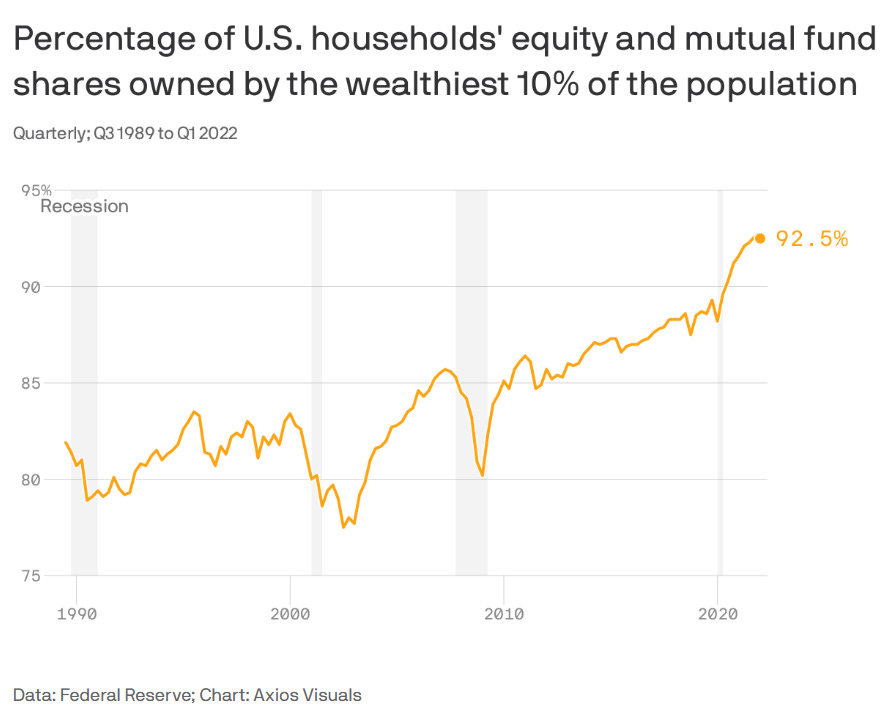“Is there any good reason to believe that inflation hits
low-income households especially hard?”
Paul Krugman, December 11, 2021
“We said was we want to see inflation move up to 2%. And we mean that on a sustainable basis. We don't mean just tap the base once. But then we'd also like to see it on track to move moderately above 2% for some time.”
“It is lower income people at the margins of the economy who have the worst experience, who experience the most pain from inflation.”
The Federal Reserve:
"Once you realize it's nonsense, it starts to make sense."
“It doesn’t matter whether you like that person, whether you like their views - what matters is the principle that you want to affirm. Do you want to live in a society in which people are required to recite ideological orthodoxies in order to be heard in media, to keep their job in journalism, or do you want to live in a society where there’s actually free speech, where people are permitted to involve themselves in debates, even with views that are unpopular, and not lose their job over it.”
“U.S. household wealth rose to a record of more than $160 trillion in the first three months of 2024 thanks to the stock market's record run and gains in real estate, Federal Reserve data showed on Friday. Household net worth rose 3.2%, or by $5.1 trillion, with the appreciation of equity holdings accounting for the lion's share of the gain at $3.8 trillion, the Fed said in its quarterly snapshot of the nation's private and public sector finances.”
I will note that the average net worth of me, Jeff Bezos and Bernard Arnault is $138.33 billion, and the median is $205 billion.
“NFIB Small Business Survey: Highest Level of the Year” Kinda reaching with the headline.
“The average monthly change in this indicator is 1.3 points. To smooth out the noise of volatility, here is a 3-month moving average of the Optimism Index along with the monthly values, shown as dots.”
“The US has created ZERO JOBS for native-born Americans since July 2018.”
“Propaganda very often works better for the educated than it does for the uneducated.”
“Propaganda very often works better for the educated than it does for the uneducated. This is true on many issues. There are a lot of reasons for this, one being that the educated receive more of the propaganda because they read more. Another thing is that they are the agents of propaganda. After all, their job is that of commissars; they’re supposed to be the agents of the propaganda system so they believe it.
It’s very hard to say something unless you believe it. Other reasons are that, by and large, they are just part of the privileged elite, so they share their interests and perceptions, whereas the general population is more marginalized. It, by and large, doesn’t participate in the democratic system, which is overwhelmingly an elite game. People learn from their own lives to be skeptical, and in fact most of them are. There’s a lot of skepticism and dissent and so on.”
“…the intellectuals are more totalitarian in outlook than the common people. On the whole the English intelligentsia have opposed Hitler, but only at the price of accepting Stalin. Most of them are perfectly ready for dictatorial methods, secret police, systematic falsification of history etc. so long as they feel that it is on ‘our’ side.”
George Orwell, Letter to Noel Wilmett, May 18, 1944
Welcome new paid subscribers!
Again, the purpose here is (mostly) to note things that are interesting to me. In the financial world, that would be things that don’t necessarily fit with the current official narrative. Since we’ve essentially been in a bull market since 2009, with historically minor hiccups every so often, the official narrative is that everything is awesome (especially for the 10% who own 93% of equities), and that stocks and real estate always go up. Therefore, the things I notice tend to be signs that the official narrative may be…incomplete.
Now these observations (along with macro in general) is mostly useless for investing purposes, until it isn’t. We all know now that on the rare occasions that stocks or real estate go down, you buy more, and then they go up again. After all, the Fed has our backs! One should keep in mind the very remote possibility that these assumptions may - someday - be challenged.
So I mostly just jot down things that aren’t widely reported, or don’t quite fit - a bit like Charles Fort back in the day. None of this is meant to depress anyone - if you want all-happy news, just put on Bubblevision1 any day of the week. I’m not mainstream, which hopefully is part of the appeal. There were a few skeptical citizen-journalists wandering in the desert in the late-1990’s and mid-2000’s, and they too were wrong and crazy, until they were not. Forewarned is forearmed.
As Jeremy Grantham says, “The only thing that really matters in asset allocation is sidestepping some of the pain when the rare, great bubbles break.” I’m never short, and I own stocks, but I am also aware of history.
Note that I am - very slowly - working on Before the Deluge, part 2. Part 1 is here.
Melody Wright
Speaking of Citizen-Journalists…
Melody Wright with Mike Farris I take Melody’s anecdotes as data.
Here’s the Houston Colony Ridge debacle video Melody mentions early on. Surreal.
NY Times article from December 2023: “Texas Housing Developer Accused of Preying on Hispanic Buyers”
“The development has grown rapidly since it first began selling properties more than a decade ago on plots cut out of dense forest about 30 miles from downtown Houston. It is now home to well over 40,000 residents spread across several separate subdivisions…the developer initiated foreclosures on at least 30 percent of the properties within three years of having sold them. From 2021 to 2022, the number of foreclosures in Liberty County surpassed the numbers in Dallas and San Antonio, according to the complaint.”
And this, from March 2024: “Texas accuses Houston developer of defrauding Hispanic homebuyers” Worth reading (and watching Melody’s videos). Really despicable stuff if true.
Melody keeps pointing out that we do not have a complete view of delinquencies. As with most of the numbers we get, the “data” is either distorted or incomplete. This is her comment after attending the Diversified Mortgage Expo Conference in Nashville:
“I know a lot about servicing, I know a lot of servicers out there, but I met some new servicers I had never seen or known before, and these people aren’t reporting up to Black Knight, who is the biggest industry - everybody takes their word for the picture of delinquency out there, but in reality they don’t have all of these smaller servicers who are dealing in this delinquency space on their platform, so we have a very incorrect idea of delinquencies.”
Melody Wright: “Black Knight reports only 1,412,133 as non-current/delinquent in April. This Household Pulse Survey from the Census reports 6,214,605. Survey is "experimental" and prone to error, but wasn't I just talking about this?”
Yes she was: "It kind of seems like maybe they [Black Knight] have 20% of servicing versus 80%, but I digress."
Melody expands more on her interview with Mike in her latest substack, Back to the Future. e.g.,
“What happens is that delinquency looks much lower based on CFPB reporting provided by FHFA since these are sold to the private markets. These loans go out to smaller servicers which do not report back to the likes of Black Knight, again illustrating how we are missing pieces of the puzzle. I met several of these servicers while at the conference that I did not even know existed.”
"The current cast of characters under Joe Biden, in my world, in finance, are unbelievable. They are so totally incompetent it's almost scary to see some of these officials functioning in housing, in other areas of finance. Janet Yellen as as Treasury Secretary? She's a joke."
Chris Whalen
“We're kind of nearing I think the end of a period when monetary policy, for a variety of reasons, has boosted asset prices rather dramatically.”
“Remember during Covid we had moratorium on mortgage payments and rent? Well, we're doing the same thing with commercial loans. We're actually giving people forbearance, we're modifying loans without declaring default, so there's a huge accumulation of defaults in the system that we have not recognized yet because politically it's unpalatable…I think commercial could be the source of the next financial crisis in this country.”
“If you want to tell me what you're going to do with interest rates, tell me and then go away. I really wish we didn't have Fed Governors and Reserve Bank presidents in the media every day telling us what they think. I don't care what individuals think, I care what the committee thinks…I think they got into trouble under Chairman Bernanke. We’ve turned the Fed into a corporate earnings exercise under Chairman Bernanke, when they decided that they needed to communicate more, to try and guide expectations. The better course, I think, would be to get rid of the dot plots, go back to a quarterly press conference - maybe tell us something actual in terms of new developments at the Fed - other than that, be quiet. Get out of our way. We've turned this into a corporate earnings exercise, Julia. They have guidance, everybody studies their statement to see which words have been deleted, which words have been added. It's totally inane. I think we'd be better off to just get a very brief factual set of guidance from the Fed - where are we going for the next year, where are we going next quarter - and that's it leave us in peace so we can get back to work, right?”
“I think Biden drops out within a month or two. Kamala Harris has to be the candidate. The Democrats can't say no to her, and she will get destroyed. I would be surprised if Kamala Harris even carries California. She didn't carry California in the primaries. Remember, she has very little political base.”
“Americans are…tired of the rest of the world. They don't want to deal with this. They're tired of their children being killed on foreign battlefields in countries where we're not even technically at war. American soldiers are in 170 countries around the world. I think that's a mistake, and politically it's definitely a mistake.”
Two issues: I tend to think the VAT tax Whalen proposes would likely be very regressive, and Whalen mentions that he’s going fishing with Mark Carney(!), who I think is a menace to society (and a possible successor to Klaus Schwab).
“Some people argue that the Fed is too data dependent, a statement that I find shocking. I can’t imagine anything further from the truth. To me the problem is not data dependence. Rather, the Fed sees the data or they ignore the data, or they try to cram the round peg into the square hole metaphorically. This year, when the FOMC came up with three rate cuts, it was not an official policy. It was only in the “dots,” but still the markets took this as guidance…
I left the Fed in the mid-1980s and became a Fed-watcher, so I went from being an insider to being an outsider. In those days, Fed officials did not talk, but there were numbers. You looked at the reserve numbers and you looked at the data for open market operations. You looked at what they did and the details of the numbers, you could figure out that they were trying to achieve. But now forty years later, they are talking. Language is evil…
I am very much opposed to the idea that monetary policy and inflation is about expectations. While expectations are important, when they put these ideas in models and give them precise values, there is a disconnection from reality. People do expect things, and that motivates behavior, but all evidence suggest expectations are not accurate and should not be entered in models with such precise values. Like r*, nobody at the Fed knows the future and nobody understands how these assumed values interact with other variables…putting everything in a model and getting a forecast is simple once you have a model. But it might be completely wrong. That’s the trade-off. And the use of models is so attractive, so technological, sophisticated, so cutting-edge, the allure is hard to avoid. But when models depend on expectations they go awry.”
Weak Data Suggesting Economy is Rolling Over with Louis-Vincent Gave
Gave (who sounds like he’s had a few tough weeks) is particularly good for getting a non-US-centric view.
“The low-end US consumer is getting squeezed. To be honest, that's my biggest concern.”
“The reality is western central banks are desperate to cut, and they'll jump at any and all opportunities to to cut. In fact with the ECB, that much was clear. In the ECB release where they actually upgraded their inflation forecasts for 2025 to I think 2.3%, and remember, their target is two percent - their ceiling is supposed to be two - so they actually forecast higher inflation but they still cut interest rates, that's how desperate they were to cut. Frankly I think that the Fed is the same. the Fed will latch on to any bad job number, any low U.S. CPI number, or any low industrial production, low manufacturing number, to to start cutting. Any number that starts to show a bit of weakness and the Fed is cutting.”
“When you look at China, I think because we've all focused on the real estate story, people are too negative.”
Davos Man
Peter Goodman: “So Davos Man is this term that I borrowed from the political scientist Samuel Huntington, who coined it back in 2004 to refer to this kind of globe-trotting elite operating above all ordinary national jurisdiction, so that they they don't have any real loyalties to any particular country. I use it in a slightly different way. I'm interested in how the billionaire class has amassed enormous profits living at standards most of us can hardly imagine, and, not just content to end up with all of this comfort and power, but asking us to buy into the idea that this is the just product of the unregulated market, and more than that, that they're the good guys, that we can entrust them with the solution of all of the most pressing problems, if we just get out of the way.
If we deregulate, if we stop taxing them, if we forget about antitrust enforcement, then the good billionaires can essentially liberate us from climate change, from the problems of racial and gender inequality, from our technological problems. We just sort of outsource all of our troubles to them, and of course that has not worked out for all sorts of reasons you could read about if you want. My previous book was Davos Man: How the Billionaires Devoured the World. Essentially, what's happened is the billionaires have used their money to purchase political power. They've used their political power to make it easier to make more money.”

New Consumer Foreclosures and Bankruptcies
Some color on the above:
Note below that the Fed didn’t hike the Fed Funds rate until March 17, 2022, by 25 basis points. “Good time to buy” had already plummeted by then (I think because of prices and insane bidding wars.)
Florida Realtor Phil Simonetta with Todd Sachs
Apparently inventory (and costs) are exploding but this part about corporate landlords interested me more:
Sachs: Are there a lot of rentals available?
Simonetta: Yeah, there's rentals all over the place.
Sachs: And who owns them? Is it corporate landlords, or are they mostly mom and pops?
Simonetta: I would say it's about maybe 70/30 corporate.
Sachs: If 70% of the rental market is owned by corporate America, and they're losing money every single month, are we going to see this inventory hit the market?
Simonetta: That's the reason I'm talking about this. I believe so. I believe it's going to hit all at once, because they can take that same money and short-term invest it, and make more money.
“What the hell is going on in Miami?”
I know rents are soft in some areas largely due to overbuilding, but nationally median rents are apparently rising again:
CRE
“This is the one that’s more indicative of where we are at in the broader market: this is a property, $57 million transaction back in 2014. The buyers at that time put an extra $26 million in renovations, so now you’ve got a basis on this of about $80 million, and then you fast-forward 10 years, and you’re effectively offloading it for $46 million, like half. This is no longer an outlier, that’s just what we’re seeing in the market.”
CRE Foreclosures Jump 117% YoY Amid Economic Uncertainty “Distress in CRE loans hit a new record for the third consecutive month, reaching 8.49% in May, up 14 bps from April…multifamily distress stands at 7.1% (down 10 bps), while office and retail distress rates fell 60 bps to 11.1% and 11.3%, respectively…hotel distress was up 70 bps to 9.4%. Industrial and self-storage properties also faced higher distress rates, up 0.5% and 0.1%, respectively.”
According to Trepp, “the universe of commercial mortgages” was $5.89 trillion in Q4 2023.
One way - probably an odd way - to think about this is that $5.89 trillion is roughly 90% of the current market cap of Microsoft and Apple combined.
I’m reminded of one of the most insightful quotes on markets from Rick Rule:
"I learned that my assets were ephemeral, while my debts were money-good."
Construction Surge Threatens Key Industrial Markets “According to CBRE, major industrial markets like Dallas-Fort Worth, Riverside, Atlanta, and Houston are set to see a significant rise in new constructions this year, pushing availability rates to record highs.”
“Phoenix leads the nation with 33 MSF under construction, with a third not completed until after 2024. This trend could drive availability rates past 12% next year. Savannah and Austin also stand out with supply pipelines nearing 12% of inventory, marking them as the only markets with double-digit supply growth.”
LinkedIn has some inspirational content
Looks like we’re not far from record territory: Nasdaq vs Dow
Genealogy Ancestor Search Using Math
“Does that mean that DNA gets so scrambled that after 10-15 generations essentially the pedigrees are completely lost? In general, yes. That is, even if we sequenced every base pair of every living person in Europe and applied infinite computational power to the problem, earlier than 1600 the number of equally probable genealogical reconstructions grows exponentially…
Go back 10 generations and each person has about 1000 discrete ancestors – and probably some overlap. Can we create a genetic footprint of all 78 million Europeans in the year 1600 and uniquely map them to their living descendants? Mostly yes, for the ones that have living descendants, and probably half of them don’t. But try this for the 61 million in 1500 and the map will be much more fuzzy.”
“We are being programmed based on what we say we are interested in. As we engage and interact with this content, the algorithm continues to build more and more of this bias. It’s effectively a black box — you can’t predict how it’s going to work or what it’s going to show you.”
Bill Fleckenstein’s term for CNBC.



























"Why you fool, it's the educated reader who CAN be gulled. All our difficulty comes with the others. When did you meet a workman who believes the papers? He takes it for granted that they're all propaganda and skips the leading articles. He buys his paper for the football results and the little paragraphs about girls falling out of windows and corpses found in Mayfair flats. He is our problem. We have to recondition him. But the educated public, the people who read the high-brow weeklies, don't need reconditioning. They're all right already. They'll believe anything."
-C.S. Lewis, That Hideous Strength
Paul Johnson’s “Modern Times” is a great read. He has a chapter on the crash and subsequent depression. I highly recommend it.